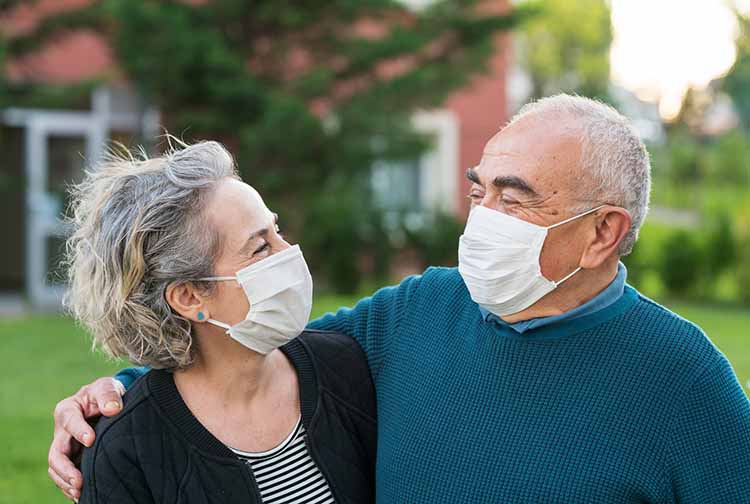Protecting older adults from COVID-19
Get the booster!
October 22, 2021 Photo: Getty Images
Photo: Getty Images
Updated October 22, 2021, to include information on breakthrough infections and booster shots.
According to the Centers for Disease Control and Prevention (CDC), adults age 65 to 74 are five times more likely than adults 18-29 to be hospitalized for COVID-19, and their risk of death is 90 times greater. This risk goes up significantly for older age groups.
The increased impact of COVID-19 on older adults is a trend witnessed by Dr. Christian Bergman, a specialist in geriatric medicine at VCU Health's Center for Advanced Health Management. He and his colleagues have witnessed this trend within their own practices.
“COVID-19 is a severe illness with increased complications associated with age,” Bergman states. “Unfortunately, as older adults age, their immune system is not as effective.”
Vaccination is your best protection against COVID-19. However, older adults are still at high risk of infection even if vaccinated (breakthrough infections), due likely to waning immunity in this population. According to the Centers for Disease Control and Infection, people over age 65 account for 67 percent of hospitalizations and 85 percent of deaths from breakthrough infections.
Older adults are especially vulnerable to COVID-19 because many live in “close quarters” in group settings, such as nursing homes or independent senior living arrangements. Combine these more crowded living situations with a weakened immune response, and conditions are ripe for severe COVID-19, Bergman says.
If you or a loved one is age 65 or older, what can you do to keep yourself and your loved one safe throughout this pandemic? Bergman explains here, and in his podcast.
First of all, get vaccinated
Keeping older adults safe starts with vaccination. Vaccination dramatically reduces your risk of getting COVID-19 or spreading the virus to others. “If you want to do something that is going to be very helpful, get the vaccine,” Bergman advises people of every age. “That's really going to help everyone in the community, including older adults.”
Now that the CDC has approved booster shots for people age 65 and older, Bergman urges older adults who have been vaccinated to get a booster. “Because of their weakened immune status, older adults are at high risk of severe COVID, even if vaccinated. That means severe symptoms, hospitalization and death.”
Follow standard safety practices
Continue to follow CDC guidelines. Wear a mask, wash your hands, stay at home when possible, avoid crowds and delay non-essential travel. These standard practices will help limit older adults' exposure to the coronavirus and help keep them from spreading it if they have it.
Don't delay care
The CDC has reported that four out of 10 U.S. adults are avoiding medical care for fear of contracting COVID-19. In response, VCU Health is making access to care easier.
At VCU Health, we offer both in-person and virtual visits with primary care doctors and specialists. We also offer home-based primary care and a nursing facility-based program — visiting patients where they live, in their homes, assisted living facilities or in nursing homes.
Additionally, we offer remote patient monitoring. Through this program, our VCU home-based primary care team monitors patients' vital signs remotely to keep patients safe where they are most comfortable — in their homes.
Take care of your mental health
While the physical harm of COVID-19 is very real, so is the impact on mental health. Bergman offers these specific steps older adults can take to improve and preserve a positive mindset:
- First, try to moderate your news intake. The current news cycle has been stressful for many people, and that can be harmful in the midst of a pandemic.
- Get outside as much as possible. “Complying with social distancing guidelines is important, but it's also important to try to get fresh air and exposure to sunlight,” Bergman says.
- Another important action is to stay connected with family and friends by phone and facetime.
- Finally, try to do at least one new thing every week. “Maybe it's exploring a new recipe, listening to an old song, or even journaling if you can. Trying to focus on the positive things in the midst of this pandemic and focusing on self-care is as important as ever,” Bergman concludes.
Listen to Dr. Bergman's podcast
To hear an in-depth conversation on this topic with Dr. Bergman, please listen to this podcast on COVID-19 and older adults.
See All News See COVID News
This article was originally published March 3, 2021.











